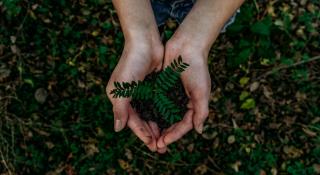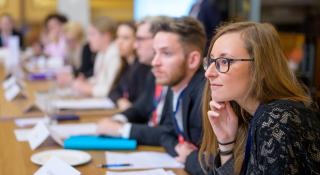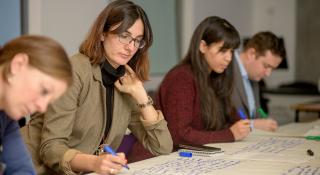
Breadcrumbs navigation
The impact of the Founders' Fund for PhD students
Our Founders' Fund helps BISA PhD student members who are reaching the final stages of writing up their thesis. We're proud of the impact it's had in helping them to reach the end of their PhD. We asked several previous recipients about their experiences, how the funding supported them in completing their PhD's, and what they've gone on to do next.
Contributors
- Aniruddha Saha (Final-year PhD candidate at King's College London)
- Maxine Rubin (University of Cape Town, South Africa)
- Paulina Jagoda Warsza (PhD candidate researcher at the University of Warsaw)
- Kodili Chukwuma (Durham University)
- Rosa Maryon (Final-year PhD student at Cardiff University)
- Syeda Bareeha Fatima (University of Aberdeen)
- Karim El Taki (Postdoctoral Max Weber Fellow at the European University Institute)
How did the Founders’ Fund help you to finish your PhD?
Aniruddha Saha: The Founders' Fund enabled me to overcome difficulties relating to my accommodation costs in the writing up year of my PhD.
Maxine Rubin: The Founders’ Fund gave me access to funding which supported my final months of writing my PhD. Funding is difficult to come by once one enters their fourth year of registration (I worked full-time during my first year so didn't have time to make good progress with the PhD). The Founders’ Fund helped address a shortfall in my funding for the last few months, which enabled me to complete my PhD without having to get a loan or a job during the critical last stage of writing.
Paulina Jagoda Warsza: As the submission phase coincided with additional family caring responsibilities, the Founders’ Fund has been a great help.
Kodili Chukwuma: The Founders’ Fund was really useful to me as a self-funded PhD student, as well as considering the impacts of the Covid pandemic on (part-time) employment and pay and the exponential rise in the cost of living. As such, this funding contributed directly towards the payment of the final instalments of my tuition fees, which made the writing up of my thesis and submission manageable.
Rosa Maryon: I applied for the Founders’ Fund in February 2023 to help cover my daughter’s nursery fees so that I can maximise my working time. I am really grateful to BISA for this as it helped take some of the financial pressure off during what is already a stressful time without the additional pressures of the cost-of-living crisis.
Syeda Bareeha Fatima: I received the BISA Founders’ Fund in the last week of 2022. I still have a few months left before I submit but the Founders’ Fund has been quite helpful in alleviating my financial stress so I can focus on completing my thesis. Apart from the monetary assistance, the fund also came as an important reminder that my work is valuable and there is a community that not only recognises my hard work but also steps up to support me. As a final-year student grappling with multiple challenges, I found the Founders’ Fund quite encouraging.
Karim El Taki: The Founders’ Fund offered me much-needed support in the final stretch to my PhD. That period was financially challenging for me. The Covid pandemic had delayed my progress and, concurrently, my family grappled with the harsh economic crisis in Lebanon. My resources to cover my daily expenses were therefore constrained and the Founders’ Fund help was valuable, enabling me to concentrate on my research while easing my financial burdens.
"The fund came as an important reminder that my work is valuable and there is a community that not only recognises my hard work but also steps up to support me."
What was the topic of your PhD?
Aniruddha: Title: Interpreting Norms and Stigma: The India-US Nuclear Relationship from 1974 to 2008. By combining and drawing from recent normative approaches in nuclear, constructivist, and critical constructivist research, my work uses an interdisciplinary lens to study the political sociology of deviant behaviour in nuclear politics. In particular, it looks at how India’s deviant identity and nuclear relationship with the US moved towards gradual normalisation, post the former’s 1974 nuclear test.
Maxine: African states' relationship with the International Criminal Court.
Paulina: The research area of my thesis covers transformations within the internalisation of Iraqi national identification, as well as the interplay of coexisting collective sub-identities during periods and moments identified as constitutive for Iraqi statehood. Identification and national identity as factors in the stability of the Iraqi state, and consequently also international relations dynamics of the region, constitute the subject of research. The scientific objective is to analyse the interdependence between the degree of internalisation of national identification and the stability of the Iraqi state. The hypothesis states as follows: The internalisation of national identification in Iraq is advancing. Therefore, there are preconditions for the emergence of primary Iraqi national identity, what constitutes a condictio sine qua non for the post-war recovery and reconciliation of diverse society, thus for the stability of the state, as implied by observed sufficient conditions.
Kodili: A critical analysis of Nigerian counter-terrorism discourse: constructions of threats, response and identity.
Rosa: My thesis is entitled: ‘Securing the state in post transition Tunisia: reconfiguring regime legitimacy in an age of authoritarian neoliberalism.’ My thesis explores the so-called neoliberalism/security nexus to understand the role that security politics plays in the reconfiguration of regime legitimacy in the post transition context in Tunisia.
Syeda: Aesthetic Battlefields: Mapping the inter-linkages between the Military, Media, Art & Culture in Pakistan’s Experience of the Global War on Terror (2001-2018).
Karim: My thesis studied the quest for social recognition in international politics with an empirical focus on the Middle East. It argued that recognition was a primary concern of Middle Eastern regimes in the 2010s. It focused on Egypt and Qatar, which were key scenes of a fierce rivalry over regional order that animated the decade following the Arab Uprisings and informed their social pursuits. My thesis investigated Cairo’s and Doha’s quests for recognition across domestic, regional, and global hierarchies, unpacking the social processes they mobilised to that end. To put it briefly, the two regimes sought recognition through different processes of social capitalisation: they socially capitalised on (mis)recognition by one party to elicit recognition by another. The thesis substantiated the argument in three fields: military procurement and cooperation, local media discourse, and lobbying in the United States.
"The grant is intended to support PhD students in the last six months of their studies, so I valued the simplicity of the application in those stressful times when I was fully focused on finishing my thesis."
What are you doing now?
Aniruddha: Being in the writing up year of my PhD, I just submitted the first full draft of my PhD thesis to my supervisors. My final submission deadline is 30 June 2023 and my viva is scheduled on 25 September 2023. I also hold an offer to begin a position as a Junior Research Fellow in Politics at St. John's College, University of Oxford, from October 2023.
Maxine: I am now doing my postdoctoral fellowship at the University of Witwatersrand in South Africa.
Kodili: I joined Durham University in August 2022 as Assistant Professor in International Security, after my PhD.
Rosa: I am due to have my viva in the next few months and have recently secured a full-time permanent senior lecturer position at the University of the West of England starting in August.
Syeda: I am writing my thesis.
Karim: I am currently a postdoctoral Max Weber Fellow at the European University Institute.
Is there anything else you’d like to add about the Founders’ Fund?
Aniruddha: The committee responsible for the Founders’ Fund may wish to think on increasing the associated funding to match the recent rise in living costs in the UK. Nonetheless, the fund remains an important support system for those with limited funding options in their writing up year of the PhD timeline.
Maxine: It's a great opportunity to access "top up" funding for one's PhD research, especially when inflation makes the real value of previous funding depreciate.
Kodili: I don’t have any comment to add but, if you don’t mind, I’d like to use this opportunity to thank the British International Studies Association for this wonderful – and truly impactful – funding scheme.
Syeda: I wish more funding opportunities had an application process like BISA. Also, I am very grateful to the BISA Trustees and Staff for this thoughtful initiative.
Karim: I am very grateful to BISA and the Founders’ Fund. One element of the application process I especially appreciated was the swiftness of the response.
Top image provided by Mathieu Stern on Unsplash


